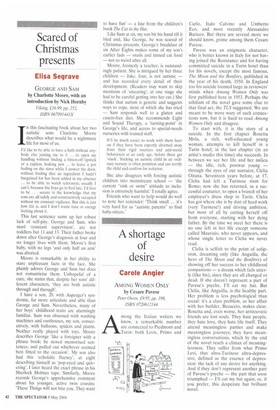Scared of Christmas presents
Elisa Segrave
GEORGE AND SAM by Charlotte Moore, with an introduction by Nick Hornby Viking, £16.99, pp. 252, ISBN 067091441X 1 n this fascinating book about her two autistic sons Charlotte Moore describes what would be a nightmare life for most of us.
I'd like to be able to have a bath without anybody else joining me in it ... to open my handbag without finding a bitten-off lipstick or a capless, leaking pen ... to leave a pot boiling on the stove while I answer the door, without finding that an ingredient I hadn't bargained for has been added in my absence .. . to be able to watch television; usually I can't, because the boys go to bed late. I'd love to be . . . secure in the knowledge that my sons are all safely and constructively occupied without my constant vigilance. But this is just how life is, and I don't waste time or energy fretting about it.
This last sentence sums up her robust lack of self-pity. George and Sam, who need 'constant supervision', are not toddlers but 11 and 13. Their father broke down after George's diagnosis at four and no longer lives with them. Moore's first baby, with no legs 'and only half an arm' was aborted.
Moore is remarkable in her ability to stare unpleasant facts in the face. She plainly adores George and Sam but does not romanticise them. Unhopeful of a cure, she states that, despite her sons' different characters, 'they are both autistic through and through'.
I have a son, 20, with Asperger's syndrome, far more articulate and able than George and Sam. Nevertheless, many of her boys' childhood traits are alarmingly familiar. Sam was obsessed with washing machines and oasthouses, my son, consecutively, with balloons, spiders and plants. Neither really played with toys. Moore describes George 'like a foreigner with a phrase book; he stored memorised sentences, and pulled out whichever seemed best fitted to the occasion'. My son also had this 'echolalic fluency', at eight describing himself as 'pop-eyed and quivering'. I later heard the exact phrase in his Sherlock Holmes tape. Similarly, Moore records George's apprehensive comment about his younger, active twin cousins: 'These Things will not bite you. They want
to have fun' — a line from the children's book The Cat in the Hat.
Like Sam at six, my son bit his hand till it bled and, like George, he was scared of Christmas presents. George's breakfast of six After Eights makes some of my son's earlier fads — snails and tinned cat food — not so weird after all.
Moore, formerly a teacher, is outstandingly patient. She is intrigued by her three children — Jake, four, is not autistic — and has recorded every detail of their development. (Readers may want to skip mentions of 'smearing'; at one stage she had to be careful getting into her car.) She thinks that autism is genetic and suggests ways to cope, most of which she has tried — Sam responds well to a gluten and casein-free diet. She recommends Light and Sound Therapy, a 'turning-point' in George's life, and access to special-needs nurseries with trained staff.
It'll be much easier to work with them later on if they have been expertly diverted away from their rigid routines and anti-social behaviours at an early age, before these get 'stuck'. Sticking an autistic child in an ordinary nursery is often pointless and can terrify the child and confirm his isolation.
She also disagrees with forcing autistic children into mainstream school — 'the current "sink or swim" attitude to inclusion is extremely harmful.' I totally agree.
Friends who want to help would do well to note her reminder: 'Think small ... it's very hard for us "autistic parents" to find baby-sitters.'












































































 Previous page
Previous page